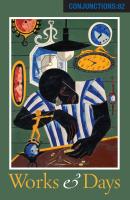 On Thursday, June 30th, at 6:00 p.m., Conjunctions celebrates the release of its spring issue on friendship, Conjunctions:66, Affinity, with a reading by contributors Robert Coover, Elizabeth Gaffney, and Stephen O’Connor at the NYU Bookstore (726 Broadway between Waverly and Washington). Copies of the issue will be available for sale and signing. The event is free and open to the public; seating is first-come / first-served.
On Thursday, June 30th, at 6:00 p.m., Conjunctions celebrates the release of its spring issue on friendship, Conjunctions:66, Affinity, with a reading by contributors Robert Coover, Elizabeth Gaffney, and Stephen O’Connor at the NYU Bookstore (726 Broadway between Waverly and Washington). Copies of the issue will be available for sale and signing. The event is free and open to the public; seating is first-come / first-served.The literary journal Conjunctions, edited by novelist Bradford Morrow and published by Bard College, has been a living notebook for provocative, risk-taking, immaculately crafted fiction, poetry, and narrative nonfiction since 1981. As PEN American Center has it: “Conjunctions is one of our most distinctive and valuable literary magazines: innovative, daring, indispensable, and beautiful.” In addition to work by Coover, Gaffney, and O’Connor, the Affinity issue includes contributions by Joyce Carol Oates, Paul Lisicky, Rick Moody and Darcey Steinke, John Ashbery, and many others. Also featured is the first publication of a poem by Robert Duncan.
ABOUT THE READERS
 The canonical metafictionalist ROBERT COOVER’s many books include The Origin of the Brunists, Pricksongs & Descants, The Public Burning, Gerald’s Party, The Adventures of Lucky Pierre, Noir, and The Brunist Day of Wrath. At Brown University, Coover established the International Writers Project, a program that provides an annual fellowship and safe haven to endangered international writers who face harassment, imprisonment, and suppression of their work in their home countries. He launched the world's first hypertext fiction workshop in 1990–91, cofounded the Electronic Literature Organization in 1999, and created CaveWriting, the first writing workshop in immersive virtual reality, in 2002.
The canonical metafictionalist ROBERT COOVER’s many books include The Origin of the Brunists, Pricksongs & Descants, The Public Burning, Gerald’s Party, The Adventures of Lucky Pierre, Noir, and The Brunist Day of Wrath. At Brown University, Coover established the International Writers Project, a program that provides an annual fellowship and safe haven to endangered international writers who face harassment, imprisonment, and suppression of their work in their home countries. He launched the world's first hypertext fiction workshop in 1990–91, cofounded the Electronic Literature Organization in 1999, and created CaveWriting, the first writing workshop in immersive virtual reality, in 2002. Praise for Robert Coover:
“Coover is still a brilliant mythmaker, a potty-mouthed Svengali, and an evil technician of metaphors. He is among our language’s most important inventors.” —Ben Marcus
“Of all the postmodern writers, Robert Coover is probably the funniest and most malicious, mixing up broad social and political satire with vaudeville turns, lewd pratfalls, and clever word plays that make us rethink both the mechanics of the world and our relationship to it.” —Michiko Kakutani
“Robert Coover is one of our masters now. The tumultuous, Babylonian exuberance of his mind is fueled and directed by his equally passionate craftsmanship. He seems to be able to do anything.” —New York Times Book Review
***
 ELIZABETH GAFFNEY (@elizgaffney) is the author of the novels When the World Was Young and Metropolis. She lives in Brooklyn.
ELIZABETH GAFFNEY (@elizgaffney) is the author of the novels When the World Was Young and Metropolis. She lives in Brooklyn.Praise for When the World Was Young:
“Elizabeth Gaffney’s wonderful, richly imagined novel When the World Was Young cheers the power and resilience of a society-bucking young woman.” —Vanity Fair
“A smart, sensitive historical novel driven by fast-paced storytelling.” —O: The Oprah Magazine
“Devastating and compelling.” —Elle
***
 STEPHEN O’CONNOR is the author of five books, including the brand-new novel Thomas Jefferson Dreams of Sally Hemmings and the fiction collection Here Comes Another Lesson.
STEPHEN O’CONNOR is the author of five books, including the brand-new novel Thomas Jefferson Dreams of Sally Hemmings and the fiction collection Here Comes Another Lesson.Praise for Thomas Jefferson Dreams of Sally Hemmings:
“By turns delicate and luminous, then searing and straightforward, Stephen O’Connor’s novel sings—it is an epic dream and an epic read. Sally Hemings and Thomas Jefferson come alive in this book, beautifully imagined, and so well-rendered that they become achingly human.” —Jesmyn Ward, National Book Award-winning author of Salvage the Bones
“A brilliant, huge-hearted act of the moral imagination. O'Connor has written a kind of quantum historical novel—simultaneously fiction and nonfiction, wave and particle. With dreamlike fluidity, the story moves from the real halls of Monticello to Jefferson's musings in the afterlife, from meditations on the phenomenology of color to what the theft of dignity means. This book creates new facts to live by; it's stranger and braver than I know how to describe. Open to any page and you will see what I mean.” —Karen Russell, author of Swamplandia
